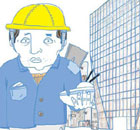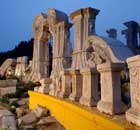-
-
China Daily E-paper
OP Rana
Haiti and the politics of climate change
By Op Rana (China Daily)
Updated: 2010-01-18 07:44
 |
Large Medium Small |
A chilling cartoon by Steve Bell in The Guardian says it all. Standing among the ruins of the Haitian presidential palace in Port-au-Prince are two persons. A speech balloon above one reads: "Perhaps if Haiti were a bank..."
The country has been the victim of nature's fury before. Barely one and half years ago, it was battered by four devastating hurricanes. And now this killer quake, which has leveled Port-au-Prince, has killed tens of thousands of people, left many trapped under rubble or missing, destroyed homes and livelihood, and shattered hope.
The government doesn't have enough resources and trained manpower to for a full-scale rescue and relief operation and has appealed to the international community for help. Promises have flown in from all corners of the globe.
Some countries, including China, have already dispatched essentials and personnel. But most of the promises are yet to materialize.
Well, Haiti is not a bank. It cannot expect to get what it has been promised. So what if it did not bring the disaster upon itself. Haiti is arguably the poorest countries in the Western hemisphere today. But till well into the 19th century it was one of the richest in the Caribbean (the richest French colony in the New World before its independence in 1804). And unlike the banks, the poor Haiti of today is not the result of its people but of foreign interventions and patronage of its dictators.
The disastrous involvement of foreign powers has prevented the island nation from building infrastructure that serves the people, and not the multinationals. That's why images on the Internet show that shantytowns built on deforested hillsides have been wiped but asphalt and concrete roads laid for vehicles of the elite are still standing.
Battered as they have been by natural and human forces for centuries, the Haitians will rise above this disaster, too, even if it is the worst to hit them in 200 years. After all, they are citizens of the only country to win independence through a slave revolution.
They, in all probability, know globalization is not for their benefit, because they are not banks or multinationals spewing clouds of greenhouse gases into the atmosphere.
It's an irony that poor countries like Haiti have to face the wrath of nature. We've seen what tropical cyclones did to Myanmar in 2008 and Bangladesh last year. We are seeing what climate change has been doing to poor countries in Africa, Asia and Latin America.
The rich and powerful nations don't even bat an eyelid before giving hundreds of billions of dollars to their banks and private companies to bail them out of trouble. But ask them to give even a fraction of that to poor countries to battle emergencies or fight climate change and its only lip service that you get.
That we are living in a global village is a myth. The global village is a concept used by the rich nations to become richer at the expense of the poor countries. What a global village we live in that does not even have a core of relief doctors, workers and equipment to help victims of natural disasters?
This is a global village where media houses have the money to hire helicopters and beam footages across the world to hike their TRPs and make more money, while aid organizations wait with relief material for transport.
Climate change has brought Haiti to a tipping point. But it neither has the money or the technology to resources to turn back.
And the rich world, which has both, is not interested in helping it or other developing countries to fight and adapt to climate change. Haitians saw that again in Copenhagen last month when rich nations obliterated all chances of a fair deal by trying to dictate terms to the developing countries.
But then why would rich world try to save poor nations (unconditionally) or the environment when there's no money to be made from of it?
E-mail: oprana@hotmail.com









